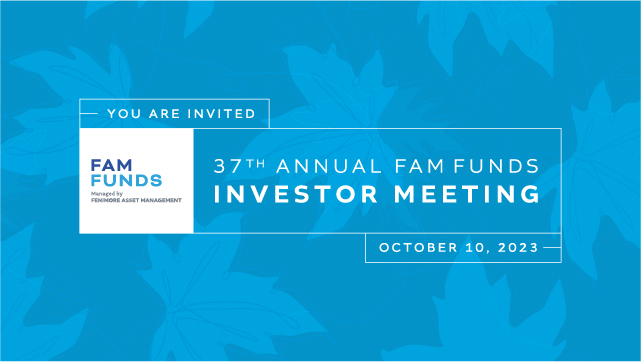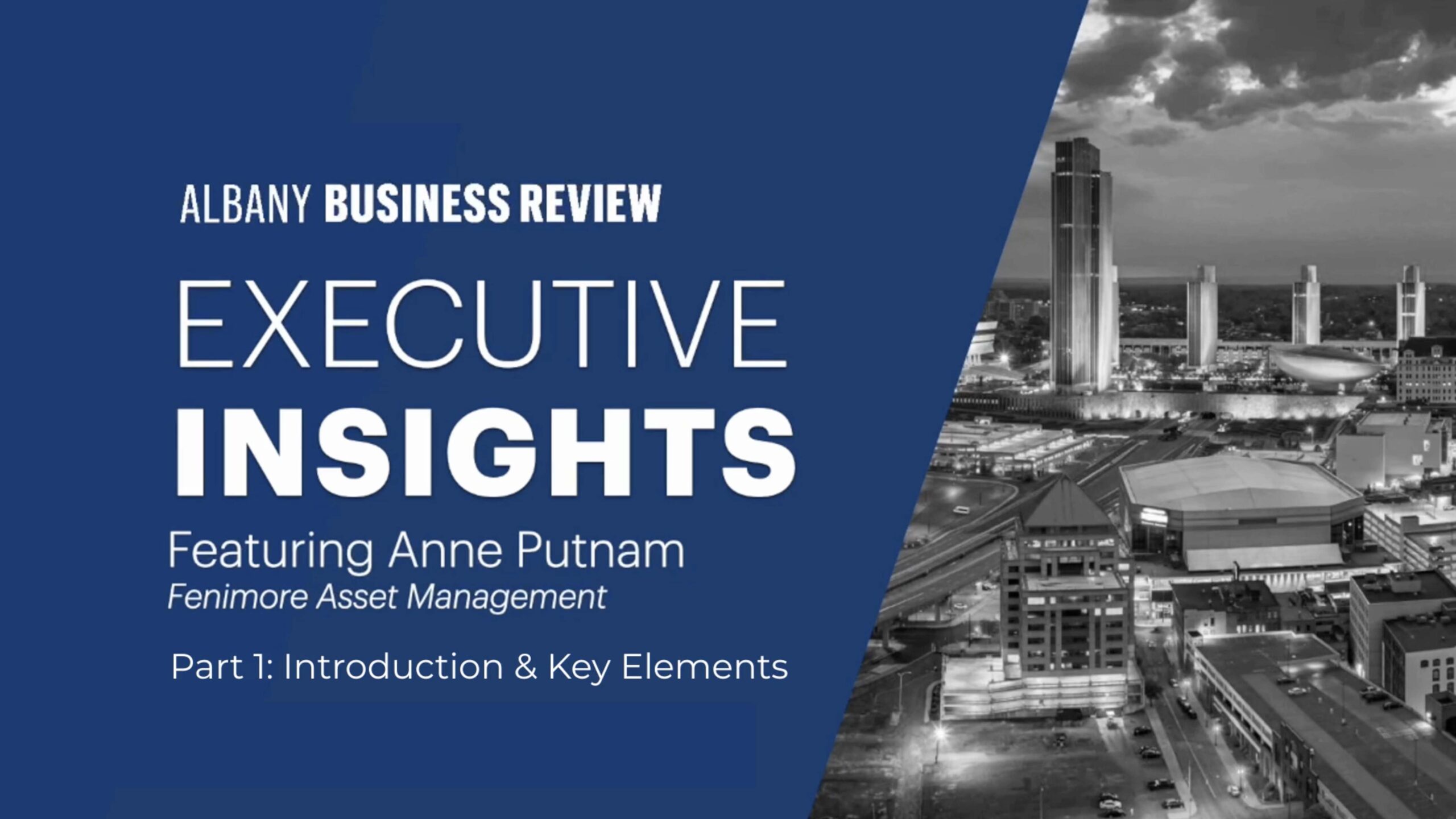Gary Dake Joins Fenimore’s Board
Gary Dake Joins Fenimore’s Board
-
Insert Text here
Fenimore Asset Management, an independent, Capital Region-based investment advisory firm and manager of the FAM Funds family of mutual funds, announces that business leader Gary Dake has joined its board of directors.
Mr. Dake is President of Stewart’s Shops Corporation. Stewart’s is a large, privately owned, and vertically integrated chain of convenience stores and gas stations with more than 355 shops in New York and Vermont. Mr. Dake is an accomplished and acclaimed leader who heads a team of more than 5,000 partners (employees). These partners own more than 40% of the company through their Employee Stock Ownership Plan. Employed at Stewart’s since 1985, he holds a BA in Economics from St. Lawrence University.
“Gary is a well-respected and admired leader both within his company and throughout the Capital Region community,” shared Tom Putnam, Founder and Executive Chairman of Fenimore Asset Management. “His integrity, expertise, success, and entrepreneurial spirit should benefit our investors over the long term.”
In addition to his extensive business career, Mr. Dake is very active as a community leader and Stewart’s Shops is dedicated to community giving and support. Between the company, Dake family foundations, and Stewart’s “Holiday Match Program,” millions of dollars have been donated to thousands of local charities. Mr. Dake is also the founder of the Dake Foundation for Children. The nonprofit was established “to provide opportunities for children with disabilities to enjoy more independence, inclusion, and fun.”
Founded in 1974, Fenimore Asset Management is an independent, nationally recognized investment manager with more than $4.12 billion in assets under management (as of September 30, 2023) through its Cobleskill and Albany offices. The firm’s team focuses on in-depth research, investing in the stocks of carefully selected quality businesses, and providing its investors with highly personalized investment services. Fenimore offers both individually managed portfolios and a family of mutual funds (FAM Funds) that can be used for retirement and other long-term investment planning.
-

Insert Image here
Part One: CEO Anne Putnam Discusses Fenimore’s 50th Anniversary and Key Elements with Walter Thorne – Albany Executive Insights
Part One: CEO Anne Putnam Discusses Fenimore’s 50th Anniversary and Key Elements with Walter Thorne – Albany Executive Insights
Anne Putnam, CEO, is honored to join Walter Thorne, Market President and Publisher of the Albany Business Review, for the Albany Executive Insights series, presented in partnership with the Albany Business Review. In Part 1 of this exclusive interview, Anne speaks to what differentiates Fenimore Asset Management as it approaches its 50th anniversary, including these key elements.
- Consistent Investment Research Process
- Tenure & Longevity of Experience
- Commitment to Community
“We will remain committed to service and that is the reason for the expansion in the Capital Region, because we want to be where investors are.”
— Anne Putnam, CEO
This sponsored interview about the Firm’s advisory services has been published by The Albany Business Review (“ABR”), a non-advisory client that provides various marketing services to Fenimore. Cash compensation was given in exchange for the publishing of this sponsored content. Due to Fenimore’s relationship with ABR, material conflicts of interest include but are not limited to a financial incentive to promote this sponsored interview. These compensated endorsements are intended to objectively showcase the Firm and its services; however, it is important to understand that compensation may have influenced the content of this article therefore we encourage clients and prospective clients to independently research and assess the Firm’s investment offerings, taking into consideration their unique financial goals, risk tolerance, and investment preferences before making any investment decisions.
Letter From Cobleskill: Autumn 2023
Letter From Cobleskill: Autumn 2023
-
Insert Text here
Dear Fellow Investor,
Earlier this year, an executive of a successful business greeted me by asking, “When’s the market going up?”
At first, I thought he was joking. The stock market was up and had been for some time. Then I realized: he was being genuine. The negative news headlines — high interest rates, inflation running rampant, a potential recession on the way — have dominated the financial landscape to the point that many people are not watching the market or even looking at their quarterly statements for fear of what they think they will see. The market is still up (as of 9/30/2023).
-

Insert Image here
SHIRKING THE WAVE, SEEKING LONG-TERM VALUE
Long-term asset growth for our investors has been one of Fenimore’s defining goals since our founding in 1974. The effects we are seeing today come from the seeds we planted — and the discipline we exercised — two and three years ago. That’s when we avoided buying so-called “pandemic winners,” such as ultra-hot businesses that we viewed as speculative, were thriving on low interest rates, or were saddled with much debt. Instead, our team held firmly to our steadfast investment philosophy that has guided us for nearly a half-century.
For example, many people hopped on the technology wave during COVID. One stock went from a $100 per share in 2019 to nearly $600 during 2020’s last quarter. Today, it’s right back to where it started. The wave crashed. For this specific firm, there was simply no long-term value in our view — and we’re looking to create long-term value for our investors.
OUR MARKET-TESTED APPROACH
Fenimore seeks to invest in quality small to mid-size companies that are available at a price below what we estimate to be their intrinsic value. We define “quality” as companies that have:
- Business models we understand, strong balance sheets, clear competitive advantages, free cash flow, and growing cash profits.
- The potential to thrive in the best economic times and weather the inevitable storms to deliver long-term, sustainable growth.
- Established and ethical management teams that we know, welcome our visits and questions, and talk candidly with us about their opportunities and challenges.
A STATEMENT OF CONFIDENCE
As we head into the fourth quarter, our research team continues to hit the road and phone to talk with the companies we own and those we’re considering buying — gathering insights into their businesses, fact-checking our instincts, and seeking to ensure that the investments we’re making on your behalf meet Fenimore’s stringent criteria.
In just the week before I’m writing this, we visited with five companies including a swimming pool supplier, software developer, and an electronic parts manufacturer. Each time we came away with strengthened confidence in their long-term potential and the role they play in delivering value to our investors.
We are optimistic that inflation could be under control next year, and economic growth and business fundamentals will be the main topics of discussion. Meanwhile, our analysts are avoiding industries that are sensitive to interest rates and susceptible to credit losses. We are planting quality seeds that we believe should produce value over time.
OUR NEW CEO
As Fenimore looks ahead to an exciting future, it’s my pleasure to congratulate Anne Putnam on her promotion to Chief Executive Officer (CEO), effective October 1, 2023.
A second-generation Fenimore leader and founding family member, Anne grew up in the firm her father, Tom Putnam, founded. After earning her professional credentials outside our walls, she returned 17 years ago to help us chart our future. Anne has contributed significantly to Fenimore’s growth, most recently as Senior Vice President since 2017. She has played a key role in maintaining and enhancing our strategic vision and value investment philosophy, as well as our enduring commitment to community philanthropy.
What’s next for me? After serving in the dual roles of CEO and Chief Investment Officer (CIO) since 2019, I am pleased to focus full time on my CIO role and the work I love most — guiding the firm’s investment management strategies and leading our talented research team as we seek quality companies that we believe should provide long-term value for our investors.
LET’S TALK
Any time you have questions or want to talk about your investments, please visit us in either our Cobleskill or Albany office, call 800-932-3271, or email us at info@fenimoreasset.com.
Best wishes for a wonderful conclusion to 2023 and thank you for your confidence.
Sincerely,
John D. Fox, CFA®
CHIEF INVESTMENT OFFICER
Fenimore Names Anne Putnam CEO
Fenimore Names Anne Putnam CEO
-
Insert Text here
Second-generation leader brings deep relationship management experience and lifelong commitment to firm’s core values to new role.
Fenimore Asset Management, manager of the FAM Funds family of mutual funds, has promoted Anne Putnam to Chief Executive Officer, effective October 1, 2023. Anne’s promotion comes as the firm founded by her father, Tom Putnam, in 1974 nears its 50th year of service to investors in the Greater Capital Region and across the country.
Ms. Putnam is an accomplished leader who has delivered results, built strong relationships, and carried out a vision of growth over her two-decade investment management career. Since joining Fenimore in 2006, she has contributed significantly to the firm’s success, most recently as Senior Vice President, a role she’s held since 2017. During her career, Ms. Putnam has served investors and financial institutions in a variety of capacities while immersing herself in all aspects of Fenimore’s operations, beginning as a client relationship manager for separately managed accounts.
-

Insert Image here
-

Insert Image here
John Fox, CFA®, Chief Investment Officer; Tom Putnam, Founder & Executive Chairman; Anne Putnam, Chief Executive Officer; Christian Snyder, J.D., CFA®, President
-
Insert Text here
“As the founder and executive chairman of Fenimore, I am excited about everything Anne brings to her new role for our investors, associates, and community. She is a proven leader with a deep understanding and commitment to our investment philosophy, and the knowledge, experience, and drive to help guide our firm to new levels of investor satisfaction and growth,” Mr. Putnam said.
Fenimore Asset Management is an independent, nationally recognized investment manager with more than $4.27 billion in assets under management as of June 30, 2023, through its Albany and Cobleskill offices. As a research-based and service-centric manager, Fenimore offers investment solutions to individuals, families, and organizations to help nurture and grow their capital over the long term. The firm’s team focuses on in-house research, investing in carefully selected quality businesses (stocks), and providing its investors with highly personalized investment solutions.
As a second-generation leader, Ms. Putnam has played a key role in maintaining and enhancing the strategic vision and value investment philosophy established by her father when he founded the firm as a means to manage family money after the Putnams sold the successful textile business started by Ms. Putnam’s grandfather. She has also been integral to continuing Fenimore’s half-century commitment to philanthropy in the community.
“Fenimore is an investment factory, like my grandfather built with his business, based on relationships with our investors, financial institutions, and portfolio-owned companies. Due to our values, we remain committed to investing in our community and giving back; it is humbling to walk in the footsteps of my forefathers,” said Ms. Putnam. “My goal as CEO is to maintain our presence regionally as a partnership owned by family and associates, expand our presence in the Capital Region, and continue to offer our investment strategies nationally through various channels. The same culture — in values-based management plus investment philosophy and process of these last fifty years — will guide us forward.”
Ms. Putnam succeeds John Fox in the CEO role. Mr. Fox will continue in his role as Chief Investment Officer (CIO) and dedicate his full attention to guiding the firm’s investment management strategies. Ms. Putnam’s promotion is the latest step in Fenimore’s carefully planned leadership succession strategy, which included the appointment of Christian Snyder as president in 2022.
Ms. Putnam is active in the community — both in Schoharie County where she was born and raised and throughout the Capital Region — through volunteerism and giving back. She currently sits on the boards of Double H Ranch in Lake Luzerne and Lakeside Chapel in Lake George.
“Anne is a highly-respected professional who is dedicated to serving our investors, our associates, and our community,” shared Michael Saccocio, a member of the Fenimore Asset Management Board of Directors and Executive Director, City Mission of Schenectady. “She exemplifies Fenimore’s commitment to excellence and is a great choice to serve as our next CEO.”
Discover Key Insights from the Jefferies Industrial Conference
Discover Key Insights from the Jefferies Industrial Conference
-
Insert Text here
The Fenimore research team recently attended the prestigious Jefferies Industrial Conference, engaging with a diverse spectrum of industrial companies, including:
- Industrial Distribution
- HVAC Systems
- Trucking
- Aerospace
- Industrial Gases
- Building Materials
- Aggregates
-

Insert Image here
Here are a few important takeaways that are shaping the industrial landscape in 2023:
- Inventory Normalization: In the wake of supply chain disruptions and surging demand, 2023 saw many industries grappling with elevated inventory levels. However, the tide appears to be turning as destocking took center stage in the first half of the year. The good news? Many companies expect this trend to find resolution in the latter half of 2023, and are highly confident that destocking woes will not linger into 2024.
- Pricing Dynamics: Companies, faced with relentless cost inflation, have responded aggressively by implementing record price hikes over the past few years. Remarkably, companies across the board are fairly resolute in their ability to return to “typical” price increases throughout 2024 and beyond, with little to no concern for deflation.
- Resilience in Capital Spending: Despite the impact of higher interest rates, companies are demonstrating unwavering commitment to their capital spending strategies. Capital costs may be on the rise, and customer demand may be showing signs of softening, but this hasn’t deterred companies from pursuing their reinvestment and mergers and acquisitions (M&A)
As part of our research process, our Portfolio Managers meet with company executives, attend conferences, and engage in face-to-face interactions throughout the year. This ‘X factor’ is what truly distinguishes us, giving us unparalleled insights into companies, their operations, competitive advantages, and challenges. It’s what fuels our confidence in every investment we make.
FAM Funds’ 37th Annual Investor Meeting
FAM Funds’ 37th Annual Investor Meeting
Fenimore Asset Management, manager of the FAM Funds, welcomes you to join us & hear:
- How our new generation of leadership continues to focus on in-depth, firsthand research and service excellence.
- The latest insights from our investment research analysts’ company visits.
- An evaluation on long-term investing through various market cycles — despite the news headlines at any given time.
Tuesday, October 10, 2023
4:00–5:00 p.m.
Cobleskill-Richmondville High School Auditorium
1353 State Route 7, Richmondville, NY
Refreshments & Complimentary Gift
BRING A GUEST — It’s a great opportunity to meet our team.
MEETING Q&A — Questions can be submitted when you RSVP or asked during the meeting.
or call 800-932-3271

The Joshua Project Summer Lunch Program
The Joshua Project Summer Lunch Program
The Joshua Project feeds our neighbors throughout Schoharie County and Fenimore was thrilled to work in partnership with them for the second time to provide lunches and healthy snacks to individuals and families during this past summer.
Throughout the month of August, every Friday a team of associates would serve pizza, prepare salads, fruits, and snacks to attendees. Across the four Fridays, Fenimore assisted in preparing and serving over 200 lunches at the Cobleskill United Methodist Church.
“The Joshua Project focuses on ‘People helping people all across Schoharie County’ — we thank them for the opportunity to serve our neighbors.”
– Frank Privitera, Director of Marketing

Making a difference over the long-term
Making a difference over the long-term
Fenimore joined forces with Siena College Men’s and Women’s Basketball teams and CAPTAIN Community Human Services to host a Court Rehab Dedication and Ice Cream Social at the newly renovated basketball court at Cheryl’s Lodge in Clifton Park, New York.
Cheryl’s Lodge was the winning recipient of this renovation as voted on by attendees at the Men’s and Women’s Siena basketball games last season.
The teams, CAPTAIN, and local fans all came together to celebrate making our community better and the lasting impact it will have on kids and their families.
“For our fans to come here to Cheryl’s Lodge, obviously CAPTAIN and Fenimore Asset Management being able to put this on to refurbish a court that the youth of the community will be able to really enjoy, it means a lot,” said Carmen Maciariello. “I’m thankful to be in this position to be able to help.”

The kids at Cheryl’s Lodge named the court, The Star Court, as a reminder that every person that steps on the court is special. The Star Court was dedicated in honor of Dr. Bill Long for all he has done to help CAPTAIN.
The mission and vision of CAPTAIN Community Human Services supports and empowers people of all ages to reach their goals of personal growth and self-sufficiency, while also strengthening communities. Cheryl’s Lodge is a program of CAPTAIN, which is a Community Outreach Center offering programming for children, families, and seniors.





